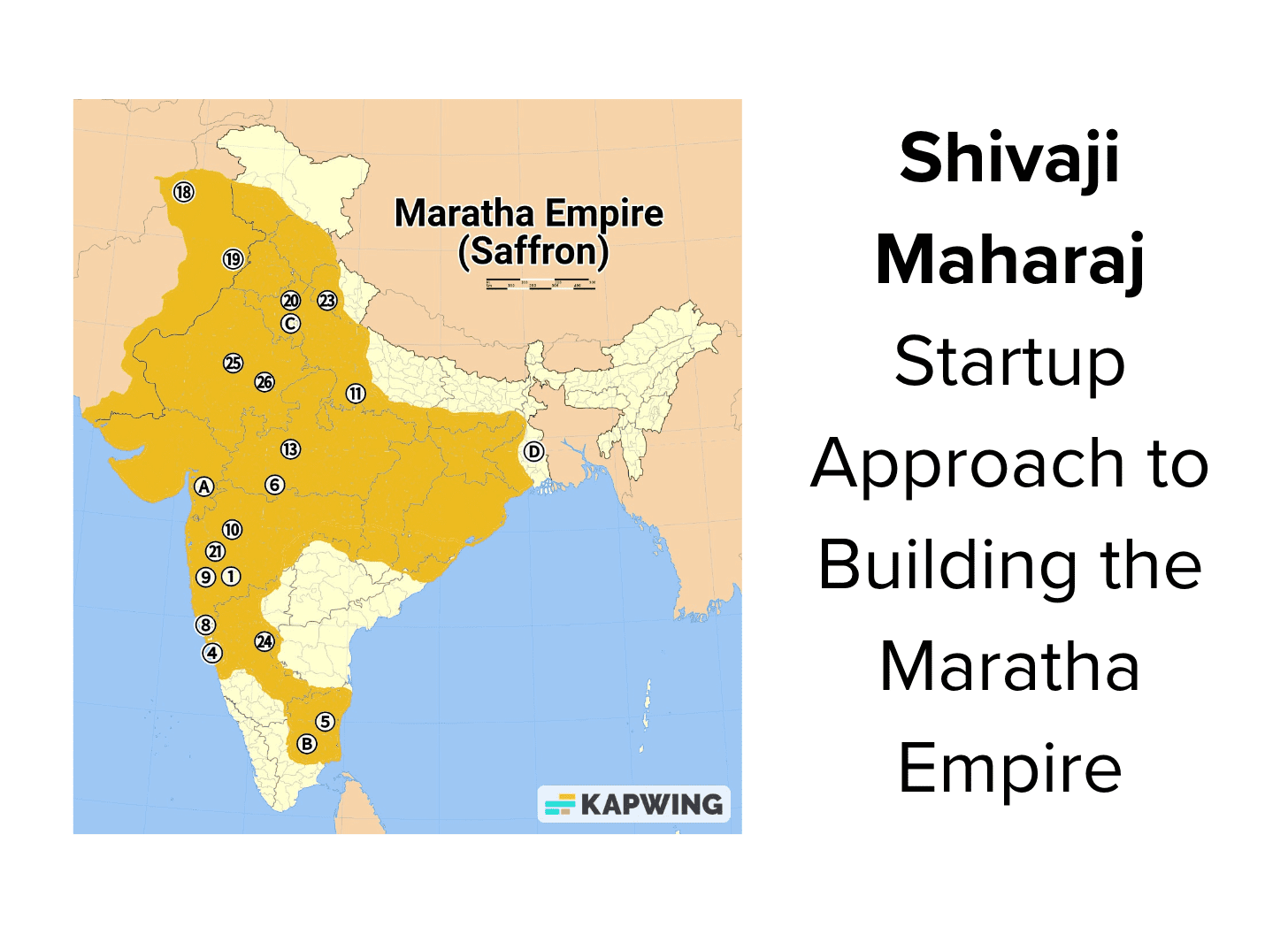Shivaji Maharaj is a legendary figure in Indian history. He was the founder of the Maratha Empire, which, at its zenith, encompassed an area of about 2,500,000 square kilometers, approximately 76% of modern-day India. Imagine the scale of the empire at its peak! However, Shivaji Maharaj began with just four forts and 2,000 soldiers, and by the end of 1680, he had expanded the empire to include 300 forts and 100,000 soldiers, laying the foundation for the future Maratha Empire. So, how did he achieve this incredible feat? Join me on a journey exploring how a 15-year-old managed to build an empire that played a crucial role in shaping India as we know it today.
Product-Market Fit:
In 1627, India was ruled by Islamic rulers, and the ports were controlled by the Portuguese. Indian traditions were being suppressed by the invaders, causing great distress among the public. Shivaji Maharaj identified this pain and sought to alleviate it. In the startup world, we call this process finding the product-market fit and addressing customer pain points.
Product Testing & Iteration:
Shivaji Maharaj recognized the need for fortified areas to establish an empire. He began with four forts and worked to address the challenges within them, essentially testing his initial model and refining it. This process is known as product testing and iteration in the startup world.
Market Timing:
The success of Shivaji Maharaj's model of governance was also influenced by timing. For a new power to emerge during the Mughal era, certain conditions had to be met:
The seat of governance needed to be far from other kingdoms' power centers.
The land had to be agriculturally unimportant.
Dense forest cover was necessary for guerrilla warfare.
The Mughal and Adil Shahi Sultanates in the Deccan region had to be in decline.
Shivaji Maharaj met these conditions, which contributed to his success. Similarly for a startup to succeed market timing plays an important role, without the market being ready one cannot sell his / her product.
Team & Strategy:
Shivaji Maharaj focused on building a formidable army and a team of senior leaders. He never directly attacked the Adil Shahi Sultanate, even after Adil Shah captured his father for seven years. Instead, he surrounded himself with trusted and talented individuals who helped lay the foundation stones for the Maratha Empire. This approach is crucial for any startup, as no single person can excel in all domains.
One example of Shivaji Maharaj's strategic prowess occurred when he was surrounded by Siddhi Johar's 150,000-strong Mughal army. Running low on supplies, Shivaji Maharaj invited Siddhi Johar to the palace and, while he was there, sent a message to Aurangzeb claiming that Siddhi Johar had turned against the Mughal Empire. This incited infighting within the Mughal army, making it easier for Shivaji to defeat them. This episode illustrates that with a strong strategy, even limited resources can be overcome.
Strong Branding and Culture:
Shivaji Maharaj created a distinct identity for his kingdom by promoting the Marathi language and culture. He established a unique code of ethics, known as 'Raj Dharma,' which emphasized values such as honor, loyalty, and courage. These principles guided the Maratha Kingdom and resonated with the people, fostering a strong bond between the ruler and subjects. Similarly, successful startups must establish a clear brand identity and culture to differentiate themselves from competitors and cultivate customer loyalty.
Adaptability and Resourcefulness:
Shivaji Maharaj consistently demonstrated adaptability and resourcefulness throughout his reign. He learned from his experiences and adapted his strategies to overcome challenges. This willingness to change and innovate was a critical factor in the Maratha Kingdom's success. Today's startups must also embrace a culture of continuous learning and be prepared to pivot when necessary to stay ahead in the ever-evolving business environment.
Innovation:
Shivaji Maharaj was an exceptional administrator and innovator at heart. Among his innovations were:
Establishing a navy.
Utilizing and improving guerrilla warfare techniques.
Employing forts as strategic assets.
These innovations were groundbreaking for their time and enabled Shivaji Maharaj to rule more effectively and outpace his competitors. Similarly, modern startups need to innovate continuously. Without innovation, they won't be able to compete with established giants. What sets successful startups apart is a team of passionate, creative individuals who are dedicated to solving customer problems through innovation.
In conclusion, we may idolize modern-day leaders, but real inspiration can be found in the rich history of our country. Shivaji Maharaj is one of the greatest founders the world has ever known. His legacy serves as a reminder of the power of perseverance, adaptability, and strategic thinking in overcoming challenges and achieving greatness.


